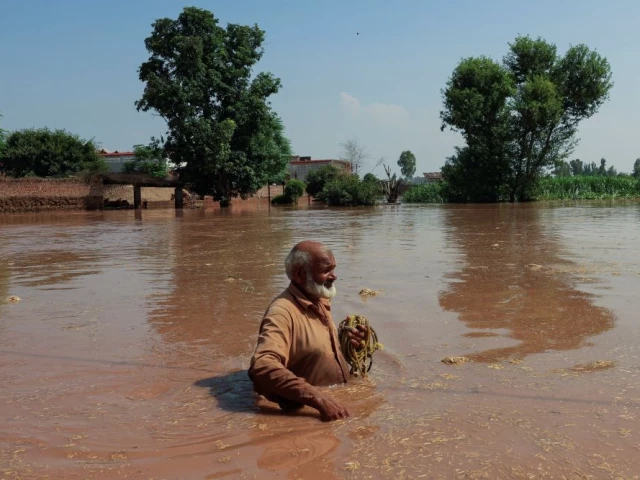Flooding in Pakistan from water flowing downstream from India was exacerbated by New Delhi’s suspension of a river sharing agreement and the collapse of gates on an Indian barrier, Pakistani officials said Friday.
Torrential Monsoon Rains has ravaged both India and Pakistan this week with more heavy rainfall forecasts for the weekend. On Friday, Floodwaters reached the outskirts of Lahore, Pakistan’s second largest city, and threatened to immerse the big city of Jhang, in what officials described as the worst flood for almost 40 years in this region.
The two countries share rivers originating from India flowing into Pakistan regulated for more than six decades under the Indus Waters Treaty. India suspended the treaty earlier this year following an attack that killed 26 people, which New Delhi accused of Islamabad-backed militant-a tax Pakistan denies.
Read more: PMD warns of ‘unusually high flood levels’ in sutlej, chenab
Ahsan Iqbal, Pakistan’s planning minister, said Reuters that India had stopped sharing decisive river flow data.
“We could have managed better if we had better information,” said Iqbal. “If the Indus Waters Treaty was in operation, we could have mitigated the effect.”
Indian media released recordings on Thursday showing that the middle part of the Madshopur barrier spanning the Ravi River had been washed away by rolling water. Pakistani officials said the damage released uncontrolled currents across the border and floods parts of Lahore.
An Indian source of government deliberately refused to flood of Pakistan, but confirmed that two gates of the barrier had collapsed. The source said streams were administered by the Ranjit Sagar Dam upstream.
“India does what can be done and all information is passed on,” the source said. “Considerable rain causes this flood.”
ALSO READ: Coas promises to restore flood -damaged minority religious places
India’s foreign and water ministers did not immediately respond to official comment. Pakistani officials said New Delhi had released four flood alerts since Sunday, including one on Friday, but without providing detailed data. Since suspending the Treaty of 1960, India has communicated warnings through his embassy in Islamabad instead of directly between water officials.
Iqbal, whose own constituency Narowal near the Indian border was severely affected, climate change had made the monsoon less predictable, emphasizing the importance of cooperation.
“Climate change is not a bilateral question,” he said. “It concerns humanity.”
On the Chenab River, Pakistani authorities on Friday blasted part of the riverbank to divert water threatening Jhang. The government evacuated more than a million people this week in eastern Pakistan, where three flooding rivers from India pose a serious risk.
According to Pakistan’s national disaster control authority, 820 people have died in the country so far this Monsun season. The flooded eastern region, home to half of Pakistan’s 240 million people and its agricultural heart, has suffered widespread crop damage.
Reporting Saeed Shah in Islamabad, Mubasher Bukhari in Lahore and Krishna N. Das in New Delhi. Writing of Saeed Shah. Editing Peter Graff.



